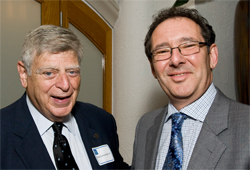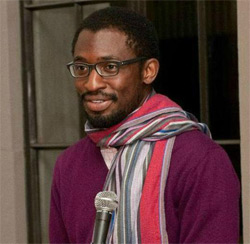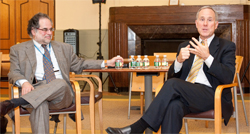Alumni Association: Grodman Program & More
print edition
Council Dinners
 Peter Carmel'70 MSD with Alumni Association President Neil Freeman'85
Peter Carmel'70 MSD with Alumni Association President Neil Freeman'85Incoming Alumni Association president Neil J. Freeman'85 began the Sept. 20, 2012, council dinner program on a sad note, calling for a moment of silence to honor the memory of Dorothy "Dottie" Estes'50, a former Alumni Association president and friend, who died Aug. 21, 2012.
After dinner, Dr. Freeman introduced guest speaker Peter Carmel'70 MSD, a renowned pediatric neurosurgeon and immediate past president of the American Medical Association, who was profiled in the Fall 2012 issue of Columbia Medicine. In his lively remarks delivered with his trademark wit and verve, Dr. Carmel spoke on "Advocacy in Medicine," offering an autobiographical account of his professional career. "I can't begin to describe how exciting it is for me to have been asked to come home and talk to you," he said. Dr. Carmel earned his MD degree at New York University and trained at P&S, pursuing research toward an MSD. "Everything I know about advocacy in medicine," he said, "I learned at P&S." He subsequently joined the P&S neurosurgical faculty at the Neurological Institute, where he founded and ran the pediatric neurosurgery division before being recruited in 1994 to lead neurosurgery at the University of Medicine and Dentistry of New Jersey.
 Uzodinma Iweala'11
Uzodinma Iweala'11Among his major influences, he recalled, were "Drs. Houston Merritt, an advocate for scientific neurology; Arnold Gold, an advocate for patients; Glenda Garvey'69, an advocate for teaching; and Linda Lewis, an advocate for students." P&S, he said, was the first medical school to include a required week of neurosurgery in the first clinical year. Dr. Carmel also saluted another profound influence, his wife, Jacqueline A. Bello'80, whom he called "a great advocate for medical institutions and their physicians." Dr. Bello is professor of clinical radiology, professor of clinical neurological surgery, and director of neuroradiology at the Albert Einstein College of Medicine. Dr. Carmel "learned and practiced advocacy for medicine at the national level" in his capacity as president of the American Medical Association, the largest association of medical doctors and medical students in the country. Addressing the current health care model of the accountable care organization, a physician-centered model of care developed at Dartmouth Healthcare, he said it took some fine-tuning, including changes recommended by the AMA, and later implemented by the government. "It is pivotal for academic medical people to be involved in politics," he said. "It is important for every academician in this room to get up and speak his or her mind. This is the way we, the members of the academic medical community, get things done locally and nationally. Find a forum. Get involved and express your views."
At the Nov. 14, 2012, council dinner, the guest speaker was Uzodinma Iweala'11, author of "Beasts of No Nation," the critically acclaimed 2005 novel about child soldiers in West Africa, and 2012's "Our Kind of People, A Continent's Challenge, A Country's Hope," a work of nonfiction about people living with AIDS in his native Nigeria. Dr. Iweala is completing his second novel while working as a fellow at the Radcliffe Institute at Harvard. Alumni Association president Neil J. Freeman'85 introduced Dr. Iweala as "possibly the youngest speaker that we've ever had on record."
Dr. Iweala described what led to the writing of his latest book, "Our Kind of People." The idea for the book came when he was working for Columbia's Millennium Villages Project in Sub-Saharan Africa. "I found it interesting that the way people spoke here in the U.S. about people with HIV/AIDS in Africa seemed altogether different from the way people in Nigeria spoke about the epidemic they were seeing. So I got really interested in how the disease itself is represented on the continent. I started following the stories that people in Nigeria were telling about AIDS." Dr. Iweala explained his research method: "What I needed to do was to sit back and listen to what people were saying, as opposed to pursuing my own agenda." In selected readings from the text he recounted testimonies from a broad range of people, including a truck driver, nurses, doctors, sex workers, shopkeepers, students, parents, children, those suffering from the disease, those caring for sufferers, and those afraid they will get it.
Marc Grodman'77 Dual Degree Program
 Marc Grodman'77 and David J. Brailer
Marc Grodman'77 and David J. BrailerOn Sept, 11, 2012, two dynamic doctors who pursued different paths in their professional lives, Paul J. Maddon'88 (MD and PhD) and Andrew Marks, MD, shared their life journeys with students gathered at the Bard Hall Lounge for the first Grodman Dual Degree Scholars Program event of the academic year. The program was endowed by Marc Grodman'77, chairman, president, and CEO of BioReference Laboratories Inc., who introduced the speakers. The program seeks to create a home for MD/MBA graduates, current students, and potential dual degree students and for other students contemplating alternative careers. Dr. Maddon, a trustee of Columbia University, is a biotechnology entrepreneur who is vice chairman of the board of Progenics Pharmaceuticals, a company he founded in his dorm room. (He was profiled together with fellow alumni entrepreneurs Ron Cohen'81 and George Yancopoulos'86 PhD/'87 MD, in the Spring 2012 issue.) Dr. Marks, the Helen and Clyde Wu'56 Professor and founding director of the Wu Center for Molecular Cardiology, chairs the Department of Physiology & Cellular Biophysics at P&S. Dr. Marks, who earned his MD degree from Harvard, also chairs the scientific advisory board of ARMGO Pharma, a company he founded to develop novel therapeutics for heart and muscle diseases. He holds six U.S. patents for new treatments. (He was profiled, along with his father, Paul Marks'49, a distinguished scientist and former dean of P&S, in the cover story of the Spring 2012 issue.)
At the second Grodman Dual Degree Scholars Program event in November, students and alumni heard David J. Brailer's account of his personal quest to shape the evolution of health care through his work as an entrepreneur, policymaker, researcher, educator, and investor. Dr. Brailer, who earned an MD degree from West Virginia University and an MBA from Penn's Wharton School, is chair and CEO of CareScience, a company he founded to develop and commercialize information technology designed to reduce medical errors and transform physician and hospital quality. The question he asked himself as a researcher was: How does a physician work? His findings showed mistakes that could have been avoided if all Americans had an electronic record of their health care histories to allow doctors and hospitals to share data easily. In 2004 Dr. Brailer was hired by President George W. Bush as the first "White House medical IT czar" to create the backbone of such a database to store medical records in one place (the National Health Information Network Inc.).
- Log in to post comments

